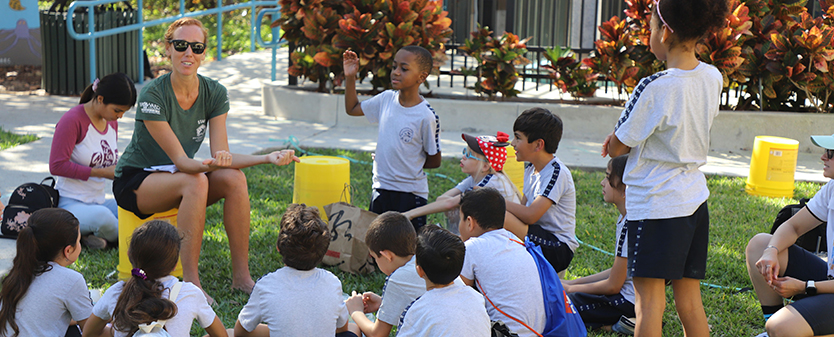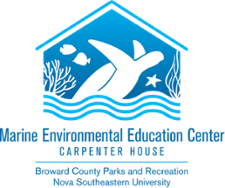
Engaging Educational Programs
Ignite a Passion for the Ocean
At the Nova Southeastern University Marine Environmental Education Center, we believe in inspiring the next generation of ocean stewards through hands-on, interactive learning experiences. Our two-hour programs are carefully crafted to immerse students in the wonders of marine biology and ocean conservation.
Each session combines engaging discussions with exciting hands-on activities, ensuring active participation and deeper understanding. Prepare for dissections, data collection, microscope explorations, beach cleanups with pollution analysis, and much more! We end our programs with an up-close observation of our resident green sea turtles, Captain and Cane, during their feeding, where students learn their unique stories and vital conservation lessons.
Field Trip Information
The MEEC can accommodate groups of up to 30 students, with one chaperone required for every 10 students. Our standard program fee is $10 per student (including the free chaperone). Please note that programs incorporating dissections cost $15 per student, to cover materials and resources.
Ready to dive in?
- Fill out our Education Program Request Form.
- Email the completed form to meec@nova.edu.
For any questions regarding our educational programs or to make a reservation, please email us at meec@nova.edu or call (954) 357-5125.
Explore Our Current Program Offerings
Our programs are designed to align with the Next Generation Sunshine State Standards and explore a variety of critical marine science topics, categorized into the following engaging themes:
Nature is a complex Jenga game where every organism has a key function in the overall food web. Just like the game of Jenga, if the wrong block is removed there can be dire consequences. During these programs we highlight the importance of organisms (and resources) in the marine environment. We learn about the adaptations that allow them to thrive in their environment. Studying these complex relationships allows us to understand the interconnectedness of the planet.
Cephalopods
During this program we learn about the aliens of the sea: cephalopods which include squids, cuttlefish, nautilus, and octopus. We discuss some of their amazing adaptations and why they are important to the marine food web. Participants complete a hands-on dissection to learn about their external and internal anatomy.
Marine Debris
With an estimated 17 billion pounds on pollution dumped into the ocean each year, marine debris is one of the biggest threats to our oceans. We will discuss different types of pollution and how to become better stewards to our environment. Participants will also learn about sustainable actions everyone can do to make our Earth a healthier planet.
Coral Conservation
Is it just a pretty rock? Or is it a complex organism that has been around for millions of years? While corals only occupy about 1% of the ocean floor, they are home for over 25% of marine life! Corals are extremely important for our oceans and they are some of the most diverse(and productive) ecosystems on Earth! Thousands of species depend on them for food and shelter while humans depend on them to act as a buffer to protect our shorelines. The diversity of these reefs also support ecotourism, fishing, and more. We will discuss these amazing animals, conservation efforts and highlight one of their biggest threats: coral bleaching. Freshwater - Earth is made up of 71%; only 3% of that is freshwater! All living things require water and we have over 7.8 billion humans as well as plants and animals on land competing for such a precious resources. This program highlights the importance of freshwater, the water cycle, and the interconnectedness of our fresh and saltwater environments.
These programs focus on animals who are at the risk of extinction. There are many causes of extinction but human actions are becoming a major cause for most animals. We discuss adaptations and morphology of these amazing critters. We identify threats these creatures face as well as highlight conservation efforts.
Sea Turtles
During this program, we discuss sea turtle biology, ecology, and conservation. We also highlight nesting season in Florida since it is such an important spot for sea turtles. Participants will meet our resident green sea turtle, Captain, and observe a live feeding of her.
Marine Mammals
In this program we highlight marine mammals and the adaptations these critters have to survive in the harsh marine environment. We discuss what categorizes an animal as a mammal as well as morphology, ecology and evolution.
An invasive species is an organism that get introduced to a new area and has a negative impact on the environment and economy. These organisms usually outcompete native species and often do not have a predator keep their population in check. There are numerous species on land and in the water that have been introduced to the US and decimated local ecosystems. These programs highlight invasive species found in Florida and the impacts they are having on our local environment.
Lionfish
This program focuses on the invasive lionfish, a fish that is native to the Indo-Pacific. Participants will learn about the history of the invasion and what adaptations allow these fish to thrive in the Atlantic Ocean, wreaking havoc on the marine ecosystem. Our educators facilitate a lionfish dissection that students get to lead to examine external and internal anatomy of these invaders.
Connect with Us


